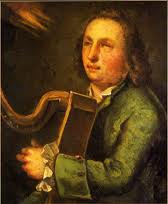Annotation:Carolan's Receipt
X:1 T:Carolan's Receipt M:C| L:1/8 R:Air N:”In the Castle of Andalusia” B:Samuel, Anne & Peter Thompson – The Hibernian Muse (London, 1787, No. 3, p. 2) N:”A Collection of the most Favorite Compositions of Carolan the Celebrated Irish Bard” Z:AK/Fiddler’s Companion K:G e2|d2 (cB) (cB)(AG)|E2 (.G2.G2)e2|d2 cB cBAG|e2(.A2.A2) Bc| (dB)(de) d2 ef|g2 fe d2 BA|(BA)GE (AG)ED|E2(.G2.G2):| |:Bc|dBde dBAG|E2(.G2.G2) Bc|(dB)(de) d2 Bd|e2 (ef) e2 {ef}g2| G2 (G/A/B) A2 (A/B/c)|B2 (c/d/e) d4|e/f/g/f/ e/d/B/d/|Te6 ga| babg agaf|gfgd edcB|cBcd efgf|edeB TA4| BcBA G2 (eg)|(dG)BA G3A|(BA)GE (AG)ED|E2(.G2.G2):|]
CAROLAN'S RECEIPT (FOR DRINKING). AKA and see "Carlione," "Carlionne," "Doctor John Stafford" (An Dochtuir Sean Stafford), "Planxty Stafford," "Stafford's Receipt for Whiskey." Irish; Planxty (listed in Roche as a March, 2/4 time, "with spirit"). G Major (most versions): D Major (Williamson): E Major (Haverty). Standard tuning (fiddle). AB (Complete Collection, Heymann, O'Farrell, O'Neill, O'Sullivan/Bunting): AAB (Johnson, Roche): ABB (Williamson): AABB (O'Farrell/Pocket). Composed by blind Irish harper Turlough O'Carolan (1670–1738) at the house of his life-long friend, Dr. John Stafford of Portabello, near Elphin, County Roscommon, who attended to O'Carolan during his last illness and who helped bear the harper's coffin at his funeral. O'Carolan had a fondness for alcoholic spirits; so much so that for his health he had been advised to abstain from drinking, and he endeavored to do this for some six weeks. During this time, however, he became increasingly morose, and his harp lay neglected. Williamson (1976) relates that "it was then that his friend... prescribed a liberal dose of whiskey with repeated applications, and the two of them sat up till dawn. The fire would be burning low and the candles guttering against the daylight, Carolan 'wild in frenzy, harp strings breaking,' and he composing this tune for the Doctor" (Williamson, 1976). O'Neill (1913), relating a tale that comes from Charles O'Conor (and printed by Walker, 1786), concludes the tale somewhat differently, and has the blind bard visiting a grocer's shop in Boyle, where he asks the clerk to pour him a measure of his favorite liquor "which I shall smell to, but indeed shall not taste." The temptation proved to great and "he once more quaffed the forbidden draught until his spirits were sufficiently exhilarated and his mind had resumed its former tone." O'Carolan immediately set about composing the tune known as "O'Carolan's Receipt," and "before the following morning he sang and played the noble offspring of his imagination in Mr. Stafford's parlour at Elphin." Stafford himself died later the same year, 1738, as did Carolan.
Another O'Carolan story relates that the harper expired with a tumbler of whiskey in his hand, though by the end he had no strength left to drink it. It was a pity, said Turlough, 'that two such friends should part, at least without kissing' (Ó hAllmhuráin, 1998). One of the bard's drinking cups was preserved by the Stafford family at Rockingham, and escaped being consumed in a disastrous fire that destroyed the great mansion in 1957 (O'Sullivan, 1958).

If sick or strong I chanced to be,
I went along-'twas well for me!-
To Doctor John to find relief,
Brave Stafford, skilful leech is he!
About the witching hour we would start our carouse,
By morn our zest for whiskey was the sharper:
Sensible man! For such was his plan
To put life in the poor blind harper!
Cho:
Sometimes tipsy, sometimes raking
Wild in frenzy, harpstrings breaking,
The custom that we followed, we will never let it die!
I tell you once again, Sirs,
I always will maintain, Sirs,
For a long and merry life of it, be drinking for aye!
At least one piper met his doom playing the tune, records O'Neill (1913). In India in the 19th century, the King of Oude became an affectionado of Irish music and desired that a piper be attached to his court. A capable piper was found and sent overseas, and received a lavish reception in Calcutta. Unfortunately, the piper took a considerable fondness to arrack, the native liquor, and while playing "Carolan's Receipt" on the state barge the king had sent to convey him upriver to Hoogly, he fell overboard and was drowned.
Early printings of the melody are to be found in Lee's Favourite Collection (1780, p. 28), Walker's Historical Memoirs of the Irish Bards (1786, p. 15) and Samuel, Anne and Peter Thompson's Hibernian Muse (London, 1786, p. 2). In the latter volume there is a note that it was "In the Castle of Andalusia," referring to John O'Keefe's comic three-act opera of 1782, with music composed by Dr. Samuel Arnold (1739–1802). Arnold arranged "Carolan's Receipt" as a duet, sung by Mrs Kennedy and Mr Brett. Donal O'Sullivan (1958) printed his version-which is often reproduced-as a composite of the aforementioned three sources, the result being "more suited to the words...than any individual copy of the tune." Scottish versions appear in print by the James Aird (Glasgow) and the Gows (Edinburgh) under the title "Carlionne-A Favorite Irish Tune," by which name it also appears in McGoun's Repository of Scotch and Irish Airs (Glasgow, c. 1799).
